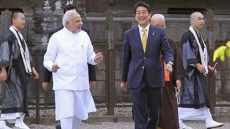DUBAI, United Arab Emirates - Dubai, the emirate known for its celebration of over-the-top glamour and luxury, is racing ahead to dominate the Middle East's plastic surgery market with plans to attract half a million medical tourists in six years.
Where cosmopolitan Beirut was once the region's best known city for going under the knife, turmoil in Syria and violence often spilling into Lebanon is driving away wealthy Arab tourists. After splashing out on medical infrastructure over the past years, Dubai already ranks globally and aims to move up the list of top international destinations for medical tourism.
It plans to attract 20 million tourists by 2020 — with half a million medical tourists bringing in revenues of 2.6 billion dirhams ($710 million). The Dubai Health Authority says that around 120,000 medical tourists came last year, generating revenue of around $200 million — a 12 per cent boost from the previous year.
That already puts it ahead of Turkey, with 110,000 medical travellers, and Costa Rica, with 40,000 to 65,000, according to 2013 figures from Patients Beyond Borders, a U.S. group that collects data on the industry. Lebanon does not rank among top countries for medical travel, but Beirut was once the region's premier spot for nips and tucks, notably drawing many Arab celebrities.
Globally, medical tourism is big business. It is estimated to generate $50 billion to $60 billion a year and grow to an annual $100 billion in the next decade.
To cash in on the boom, Dubai has rolled out three-month renewable visas for medical tourists and their companions and launched a campaign to brand itself as the Middle East's top destination for wellness and plastic surgery.
Vasilica Baltateanu, who started up the United Arab Emirates' first plastic surgery consultancy, Vasilica Aesthetics, said Dubai's glamour factor is driving the trend among the region's well-heeled tourists who want to shop, indulge in spas and relax in opulent hotels.
"You don't find them going anymore to Beirut and (they) are coming to Dubai. Why? It's much safer in Dubai," she said. "I think they also choose Dubai because there are the best restaurants here, the best hotels. So you do a surgery and at the same time you can have a nice holiday."

The World Travel & Tourism Council said in its annual 2014 report that the UAE was expected to attract 12.2 million international tourists this year, with Lebanon welcoming just 1.3 million.
A company specialized in laser treatments, Silkor, says it brought its business to Dubai instead of waiting for Gulf clients to come to Lebanon, where it has opened eight branches since its founding 15 years ago. In less than half that time, the company established six branches in the UAE and has plans to open two more.
"Gulf clients would come to Lebanon in the past," said Owner Representative Sylva Wayzany, adding that now "unfortunately the situation in Lebanon doesn't help" to make it attractive for medical tourists.
To cater to the Gulf's demand for cosmetic procedures, Dr. Luiz Toledo, one of the world's most famous plastic surgeons in liposuction and the "Brazilian butt lift," closed his practice in Brazil and moved to Dubai in 2006 because he saw less competition in the Gulf and an opportunity to keep quality and prices up.
"If you think about 20 years ago, nobody in the world heard about Dubai. And today there is not a person in the world that hasn't heard about it," said Toledo.
Last year, he saw patients from 73 different countries. His new practice has a private wing for high-rolling Arab clientele.
Dubai has rapidly become home to one of the world's highest saturations of plastic surgeons. Toledo says that in the U.S. there are 20 plastic surgeons for every 1 million people, compared to 52 per million in Dubai. The Emirates Plastic Surgery Society, a professional group where he is a board member, says its membership has more than doubled to 150 in the past eight years.
The Dubai Health Authority says there are around 150 licensed plastic surgeons in Dubai alone.

Emma Jordan, a 33 year-old British resident of Dubai and mother of three, chose to undergo breast augmentation and stretch mark removal here instead of in London, because while the price was similar at around $9,200, waiting times were shorter and the procedure more personal.
"I think possibly back home, it's more clinical. You have a consultation; you don't always see the surgeon before and after. Sometimes you see a nurse (instead)," she said. "It's a huge difference."



